#russification
Text



Nothing new indeed. Here are just some russified Finnish place names from the Karelian Isthmus:
Antrea -> Kamennogorsk
Enso -> Svetogorsk *
Heinjoki -> Veshchevo
Johannes -> Sovetsky
Jääski -> Lesogorsky
Kanneljärvi -> Pobeda
Kaukjärvi -> Kamenka
Kirvu -> Svobodnoye
Kivennapa -> Pervomayskoye
Koivisto -> Primorsk
Koivistonsaari -> Bolshoy Beryozovy
Kuolemajärvi -> Pionerskoye
Kähäri -> Goncharovo
Käkisalmi -> Priozersk
Lavansaari -> Moshchny
Metsäpirtti -> Zaporozhskoye
Raivola -> Roshchino
Rautu -> Sosnovo
Räisälä -> Melnikovo
Säkkijärvi -> Kondratyevo **
Terijoki -> Zelenogorsk
Uuras -> Vysotsk
Uusikirkko -> Polyany
Vahviala -> Yashino
Valkjärvi -> Michurinskoye
Vuoksenranta -> Ozyorskoye
Ylä-Urpala -> Torfyanovka
* The name lives on in the name of the company Stora Enso
** You may recognise the name from the song Säkkijärven polkka
Place names in the ceded Petsamo, Salla, and Ladoga Karelia, have largely been left alone.
The population of the ceded Finnish territories was also completely replaced.

Please feel free to list more russified places from other countries.
#war in ukraine#russian war on ukraine#russian aggression#russian invasion#russia is a terrorist state#russian imperialism#russian colonialism#cultural genocide#russification#suomi#finland#historia#*
323 notes
·
View notes
Text


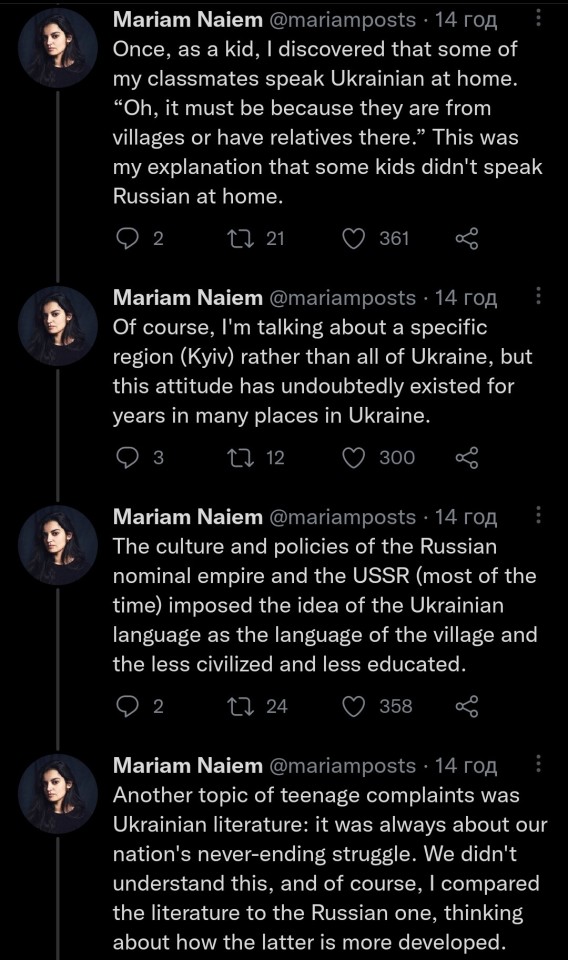

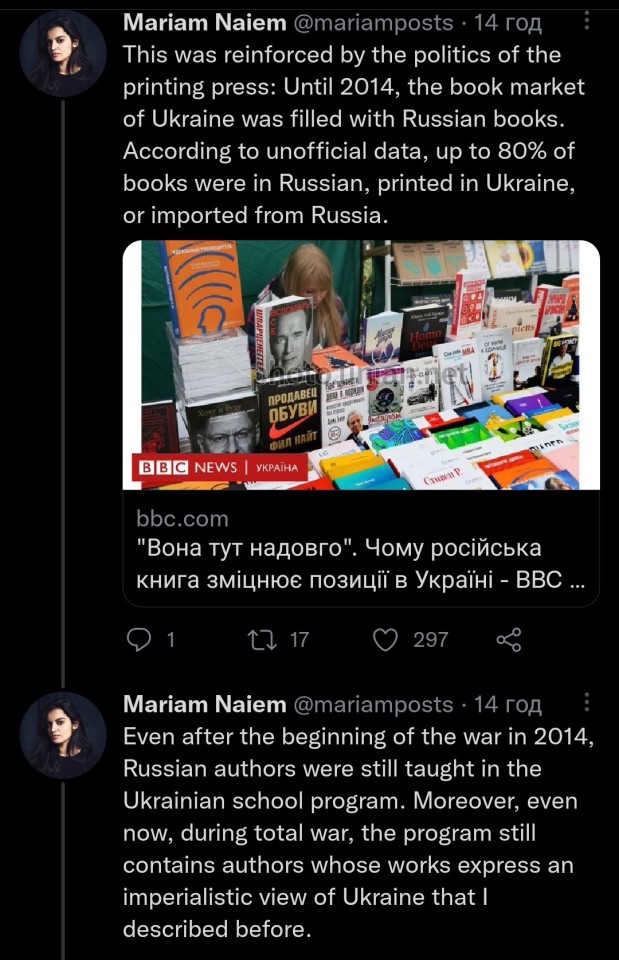

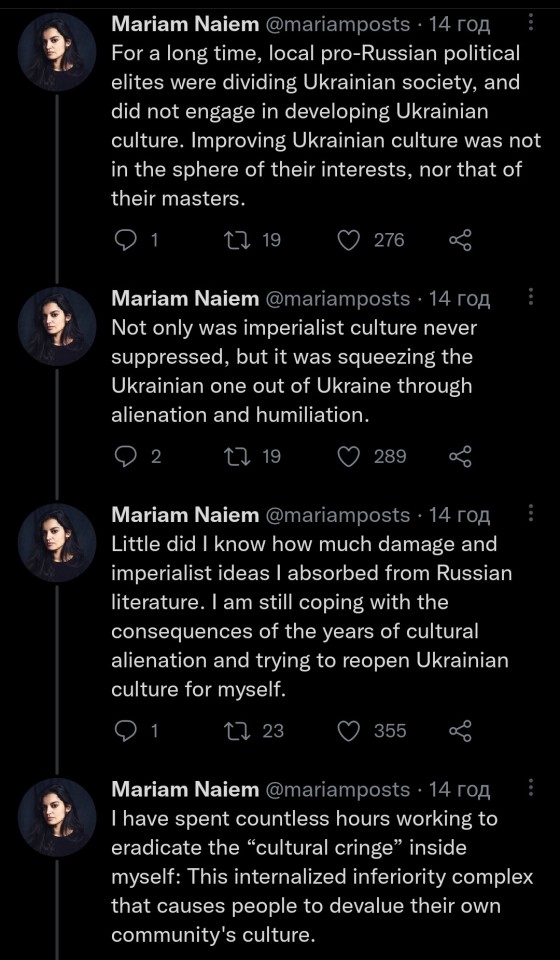

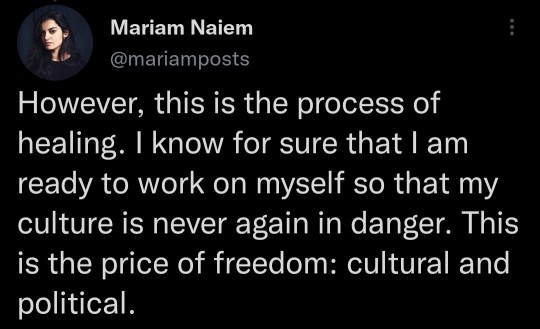
#as someone who grew up in kyiv i relate to all of this#and to russians questiining this hegemony and trying to fight it is russophobia and 'oppression of russian speakers'#ruscism#ukrainian culture#ukraine#russification
1K notes
·
View notes
Text

Very interesting thread about how russification replaced Ukrainian church crosses with russian ones:
Ukrainian crosses (resemble the sun, have no oblique third line from below):

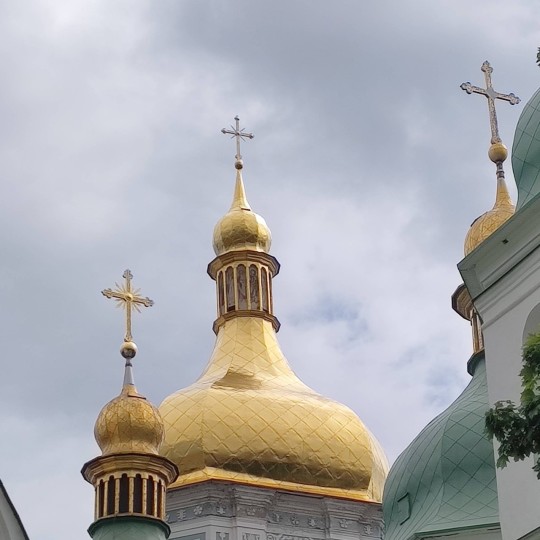
russian church crosses:

8 notes
·
View notes
Text
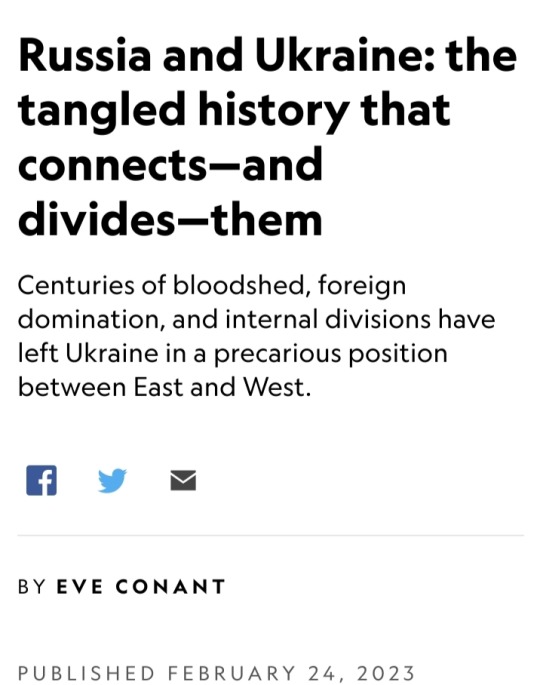
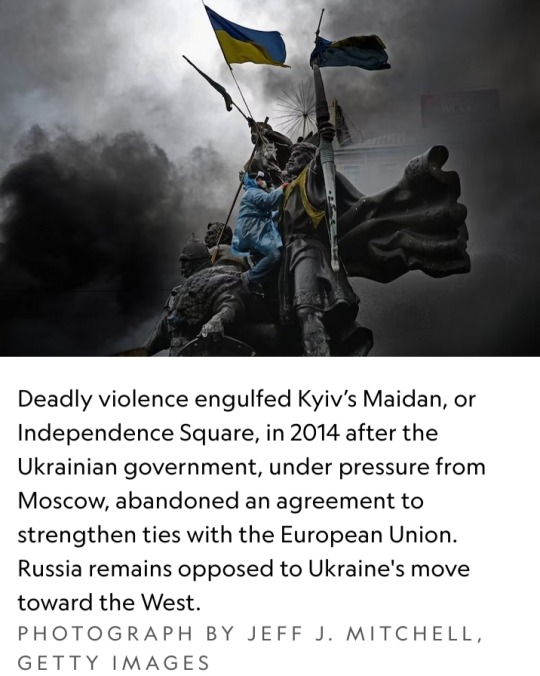
It’s been a year since Russia invaded Ukraine, and the battle continues.
Military and civilian deaths and injuries on both sides have been estimated in the hundreds of thousands, and millions more Ukrainians have been displaced.
What set the stage for today’s conflict? Here’s a look back at the long, intertwined history of the contentious neighbors.
The two countries’ shared heritage goes back more than a thousand years to a time when Kyiv, now Ukraine’s capital, was at the center of the first Slavic state, Kyivan Rus, the birthplace of both Ukraine and Russia.
In A.D. 988, Volodymyr the Great, the pagan prince of Novgorod and grand prince of Kyiv, accepted the Orthodox Christian faith and was baptized in the Crimean city of Chersonesus.
From that moment on, Russian leader Vladimir Putin recently declared, “Russians and Ukrainians are one people, a single whole.”
Yet, over the past ten centuries, Ukraine has repeatedly been carved up by competing powers.
Mongol warriors from the east conquered Kyivan Rus in the 13th century.
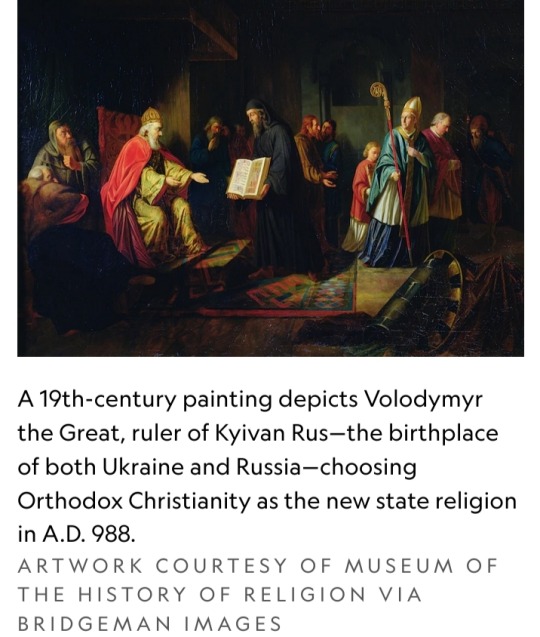
In the 16th century, Polish and Lithuanian armies invaded from the west.
In the 17th century, war between the Polish-Lithuanian Commonwealth and the Tsardom of Russia brought lands to the east of the Dnieper River under Russian imperial control.
The east became known as "Left Bank" Ukraine; lands to the west of the Dnieper, or "Right Bank," were ruled by Poland.
More than a century later, in 1793, right bank (western) Ukraine was annexed by the Russian Empire.
Over the years that followed, a policy known as Russification banned the use and study of the Ukrainian language, and people were pressured to convert to the Russian Orthodox faith.
Ukraine suffered some of its greatest traumas during the 20th century.
After the communist revolution of 1917, Ukraine was one of the many countries to fight a brutal civil war before being fully absorbed into the Soviet Union in 1922.
In the early 1930s, to force peasants to join collective farms, Soviet leader Joseph Stalin orchestrated a famine that resulted in the starvation and death of millions of Ukrainians.
Afterward, Stalin imported large numbers of Russians and other Soviet citizens—many with no ability to speak Ukrainian and with few ties to the region—to help repopulate the east.
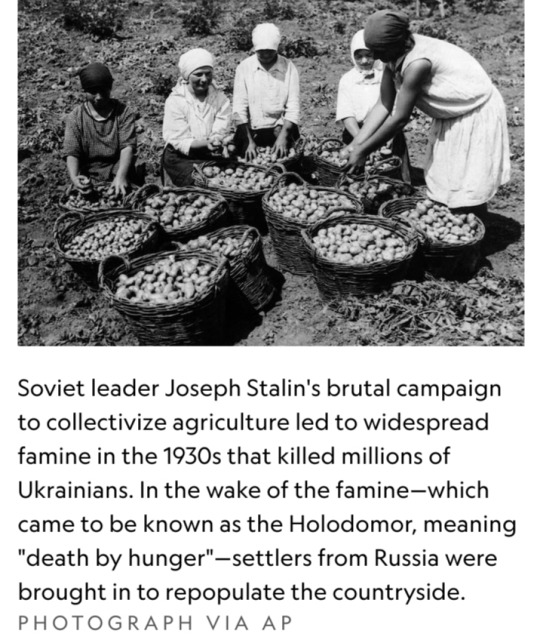
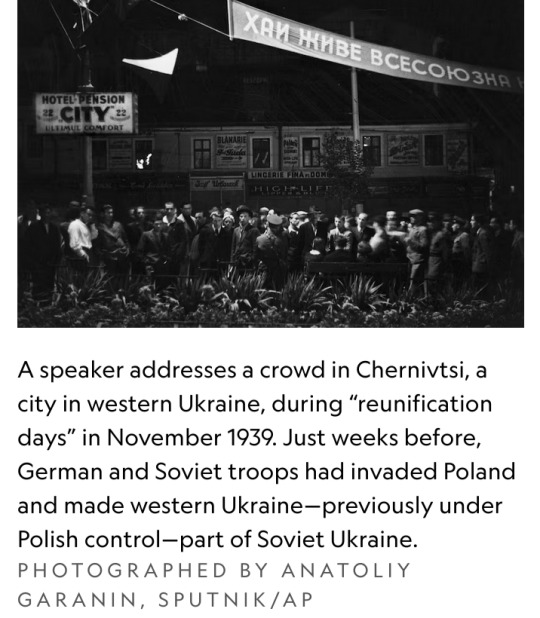

These legacies of history created lasting fault lines. Because Eastern Ukraine came under Russian rule much earlier than western Ukraine, people in the east have stronger ties to Russia and have been more likely to support Russian-leaning leaders.
Western Ukraine, by contrast, spent centuries under the shifting control of European powers such as Poland and the Austro-Hungarian Empire — one reason Ukrainians in the west have tended to support more Western-leaning politicians.
The eastern population tends to be more Russian-speaking and Orthodox, while parts of the west are more Ukrainian-speaking and Catholic.
With the collapse of the Soviet Union in 1991, Ukraine became an independent nation. But uniting the country proved a difficult task.
For one, “the sense of Ukrainian nationalism is not as deep in the east as it is in west,” says former ambassador to Ukraine Steven Pifer.
The transition to democracy and capitalism was painful and chaotic. Many Ukrainians, especially in the east, longed for the relative stability of earlier eras.
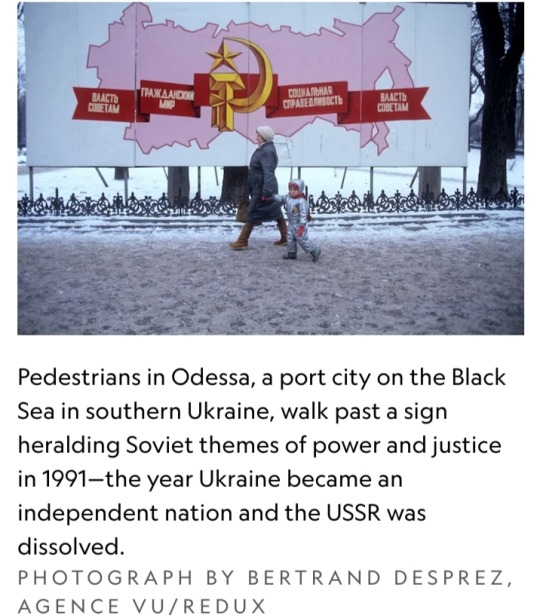
"The biggest divide after all these factors is between those who view the Russian imperial and Soviet rule more sympathetically versus those who see them as a tragedy," says Adrian Karatnycky, a Ukraine expert and former fellow at the Atlantic Council of the United States.
These fissures were laid bare during the 2004 Orange Revolution in which thousands of Ukrainians marched to support greater integration with Europe.
On ecological maps, you can even see the divide between the southern and eastern parts of Ukraine—known as the steppes—with their fertile farming soil and the northern and western regions, which are more forested, says Serhii Plokhii, a history professor at Harvard and director of its Ukrainian Research Institute.
He says a map depicting the demarcations between the steppe and the forest, a diagonal line between east and west, bears a "striking resemblance" to political maps of Ukrainian presidential elections in 2004 and 2010.
Crimea was occupied and annexed by Russia in 2014, followed shortly after by a separatist uprising in the eastern Ukrainian region of Donbas that resulted in the declaration of the Russian-backed People’s Republics of Luhansk and Donetsk.
Today, the two countries find themselves in conflict yet again, fault lines that reflect the region's tumultuous history.
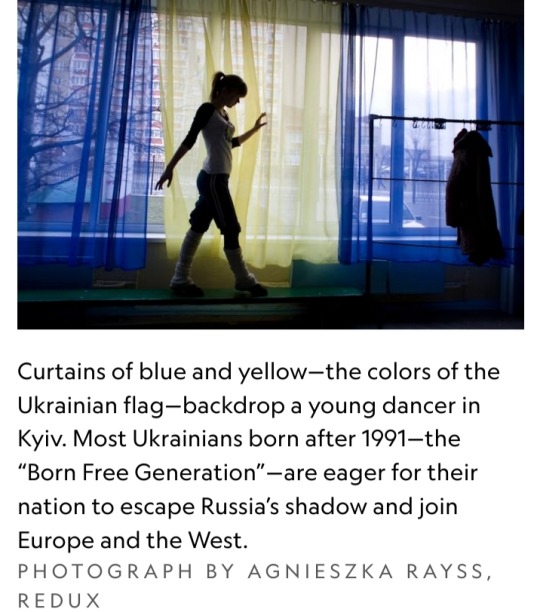
Portions of this article were originally published during the 2014 Crimean crisis. It has been updated to reflect current events.
#Ukraine#Russia#Kyiv#Kyivan Rus#Volodymyr the Great#Vladimir Putin#Russification#Joseph Stalin#2004 Orange Revolution#Volodymyr Oleksandrovych Zelenskyy#Volodymyr Zelenskyy
40 notes
·
View notes
Text
youtube
I have just discovered this channel - it's about ukrainian culture. They cover forced or coerced russification in Ukraine, even after collapse of Soviet Union. it's unheard of for me to impose your language and culture on another sovereign state, ilke russia did.
This episode is about pop music in Ukraine. Here is some of my thoughts:
--> Quotas work. Whenever somebody tell you: there is not enough talented black people or women writers or Ukrainian speaking singers, don't believe them.
--> I envy Ukrainian's or Baltic state's folk festivals as a tool of resistance against soviet regime. Folk music is all about power of the people, roots and identity. And singing in polyphony with flower crown on your head is definetly cooler than roman catholic mess for motherland (which was Polish tool of resistance).
--> Since Ukraine found its voice (again), I started to follow Ukrainian music. I love how Ukrainian artists mix tradition with modernity. My favorite band from Ukraine is Onuka. You should check them out.
--> I love the host! Is he someone famous in Ukraine?
--> Ukrainian '90s pop is so fun! I should add these artists to my playlist.
3 notes
·
View notes
Text
Google translation:
Gruesome reports from Ukraine. "Children may never see their relatives again"
The Russians are committing more gruesome deeds in Ukraine. According to the latest reports, subsequent groups of children are forcibly sent to Russia. - A decision was made to murder some of the Ukrainians and "de-Nazify" the rest. They will be forcibly Russified, their memory of Ukraine will be taken from them. The Russian authorities do not hide their criminal intentions, says Maria Domańska, an expert on Russia from the Center for Eastern Studies, in an interview with the Polish Armed Forces. - He really steals our future - adds another WP interlocutor Maks Grabowski, a journalist from Sigma TV, survivor of Mariupol.
Once again, we hear information about the forced deportation of Ukrainian children to Russia. As early as June, the international commission of inquiry of the UN Human Rights Council received signals about kidnappings from orphanages in the Ukrainian territories occupied by Russia.
The Russians have taken 5,100 children from Ukraine to their territory since the beginning of the invasion, the Ukrainian portal Euromaidan reported. Moscow places minors in Russian families to Russify and cut them off from their loved ones. Referring to the Ukrainian ombudsman for children's rights, Daria Herasymchuk, Euromaidan pointed out that the removal of children to Russia "is a crime that must touch the world's conscience."
This is a nightmare for the Russians. The first German Cheetahs in action at the front
Daria Herasymczuk, the Ukrainian spokeswoman for children's rights, emphasized that not all the children sought are orphans. The list also includes those who were deported with their parents or relatives, as well as children who were forcibly separated from their families.
Already in April, we reported in Wirtualna Polska that the Russians had announced that "orphans and children who ended up in Russia without their parents, would be adopted by Russian families under a simplified procedure and would receive Russian documents."
It means that they will be assimilated. Human rights defenders and Ukrainians oppose this, saying that they are in fact kidnappings - said Katarzyna Chawryło from the Center for Eastern Studies in an interview for WP.
On May 30, Russian President Vladimir Putin issued a decree simplifying the procedure for granting Russian citizenship to Ukrainian children from orphanages.
"Forced transfer of children from one group to another is genocide"
Krasnodar authorities have announced in recent days that "over 1,000 children from Mariupol have found new families in Russia". Maria Domańska, an expert on Russia from the Center for Eastern Studies, in an interview with Wirtualna Polska, emphasizes that "first, the occupiers murdered their parents and razed their hometown to the ground, then kidnapped the children to Russia and now they are trying to 'legalize' these crimes, boasting about adoptions ".
Children given to Russian families may never see their parents or relatives again. They will be forcibly Russified, their memory of Ukraine will be taken from them, he says.
And he adds that "within the meaning of the 1948 UN Convention on the Prevention and Punishment of the Crime of Genocide, the forced transfer of children of members of a group to another group is genocide if it is intended to destroy a nation in whole or in part." - There is a concept of cultural genocide, according to which the criterion of crime is not so much the physical extermination of members of a given group, but the destruction of the identity of this group, destroying it as a separate entity - he emphasizes.
Her brother was taken prisoner by Russia. "I would do anything to see him alive again"
"Russia can play with their fate as a bargaining chip"
The Russian authorities do not hide their criminal intentions. First, for years, people refused to recognize that the Ukrainian nation was a separate entity from Russia, that it had its own culture, language and identity; editor's note). Then a decision was made, implemented from February, to murder some of the Ukrainians and "re-educate" and "de-Nazify" the rest. Sometimes the propagandists spoke directly about the need to "de-Ukrainianise Ukraine" - emphasizes the expert.
As he emphasizes, "it is worth remembering that in the occupied territories the occupiers not only commit direct terror against civilians, but also, for example, destroy library and archival resources, eliminate the Ukrainian language from schools, they destroy Ukrainian monuments. "
The expert emphasizes that "according to UN estimates, over 2 million Ukrainians went to Russia". It was often the only direction they could go to get away from Russian missiles. Some of them were forced to leave. These people, in the territory of the aggressor state, are hostages to the Putin regime. Russia may play with their fate as a bargaining chip in future negotiations with Ukraine, he explains.
Domańska adds that "the situation of Ukrainian refugees in Russia varies greatly depending on the region." - Human rights defenders, however, receive numerous reports about problems with the legalization of stay (only in individual cases has the refugee status been granted - editor's note). Contrary to the promises of the authorities, many families do not receive the announced financial aid and are therefore destitute. Those who are looking for a job often hear that they should apply for Russian citizenship first, she emphasizes.
"Putin steals our future"
Maks Grabowski, a journalist from Sigma television, survivor of Mariupol, in an interview with Wirtualna Polska, emphasizes that "the first evidence of this began to appear as soon as the Russians entered Mariupol".
A way to reverse the signs of aging very quickly
They deported to Russia children from bomb shelters, children whose parents were killed. They separated the children from their parents. In social networks, the Russians are actively discussing this topic and are even glad that our children are exported to Russia, and not evacuated to the territory of free Ukraine, he says.
And he emphasizes that "Putin has signed a decree to simplify the acquisition of Russian citizenship for stolen children." "He's really stealing our future," he adds.
Olena Halushka, co-founder of the International Center for Ukraine's Victory, posted screenshots from the aforementioned Russian entries on Twitter.
She wrote: "The Russians are proud to have kidnapped 1,300 children from Mariupol, 1,000 of whom are already housed in families throughout the terrorist state. The entire second paragraph of the news is devoted to financial bonuses for families who 'adopt' children (…)".
#ukraine#russia#war#war crimes#genocide#kidnapping#child abduction#ww2#nazism#fascism#rashists#russification
37 notes
·
View notes
Text
#russia#kazakhstan#settler colonialism#tsarist russia#soviet union#russian federation#russian colonialism#russification#background information
0 notes
Video
youtube
Did the Soviet Union Russify Other Nationalities? - Cold War DOCUMENTARY
0 notes
Text
The statue of catherine removed in Odesa.This is a symbol of russification.She gave her lover(which she had a lot), pyotr zavadovsky,"4,000 Ukrainian peasants". Turned free people to slaves.
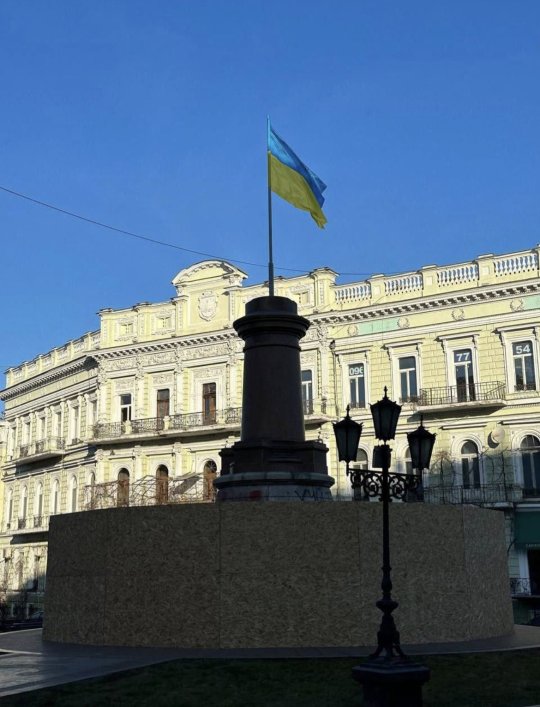

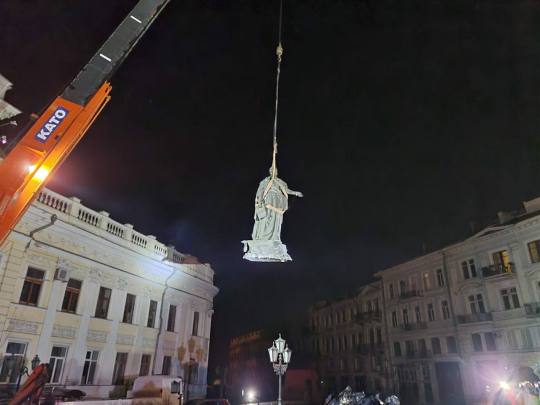
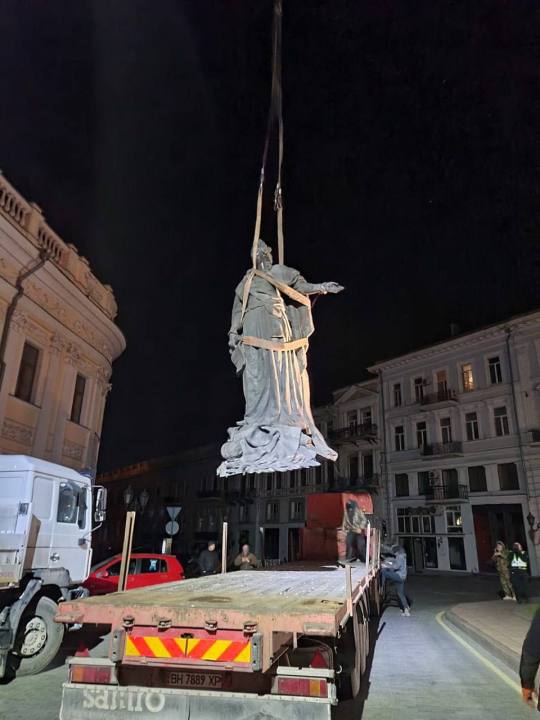
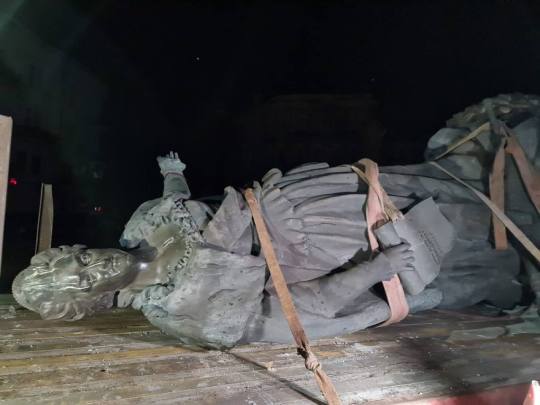

#ukraine#war in ukraine#caterina#odesa#war 2022#finally#the symbol of russification#statue of caterina removed#removed statue#ukraine under attack#ukrainians don't need russian symbols#russian empire must end#odesans#stand with ukraine
313 notes
·
View notes
Text
American tankies who proclaim themselves as "communists" and haven't touched a history book since the age of 10 when an actually slavic person who is still dealing with the aftermath of colonization tells them the soviet union wasn't all so great and Joseph Stalin is not someone to be idolized (someone is saying bad things about their favourite glorious dictator and the only thing they can do about it is to make a post in their redfash social media echo-chamber):

#seeing lots of vile idolization of the USSR and russia lately#i'm enraged so i'm making fun of tankies#it is always morally correct#before you come at me; my entire family are victims of russification and we're still dealing with the colonization#don't you even DARE try to 'debate' me#i know more than you.#tankie punks fuck off#gif
16 notes
·
View notes
Text
Also it's funny when people claim that "ukrainians are a made up nation" and then in the very next sentence argue for ussr which didn't even hide the fact that it was trying to create a "soviet nation"
#which in reality turned into russification and destruction of diversity#people were lied that they had internationalism but the russian nation stood above every other#not to mention putin's panslavism which was invented by a ukrainian theologist
116 notes
·
View notes
Text
You will never hear a russian admitting they are responsible for occupation of Ukraine and destruction of our culture and language... but for some reason, you can hear a Lithuanian joking that GDL was a soft occupation of Ruthenia (Ukraine), although it was probably the time of biggest prosperity and development. GDL was a very progressive and unique state for its times at least because of their famous principle "Старого не руйнуємо а нового не впроваджуємо" - "We don't destroy the old and we don't introduce the new". For Ukrainians, who were suffering from the Horde a lot and even left their homes for a while, it was shocking a bit. Yeah, we had a coup d'etat, change of power... and that's all. in fact, Lithuanian (and Belaruthian too) Dukes on our lands were the only power who learned our language and did not impose theirs on us. They managed the farm well and paid very generously.
There are practically no complaints left by Ukrainians against the Grand Duchy of Lithuania, which is a sensation because Ukrainians can't live without scolding our government. And if there were any left, the Rzeczpospolita and later the moscow dutchy would certainly have used them.
I think the next time I hear about the soft occupation (which is cute imo, instilling a sense of guilt for what happened ~700 years ago?), I need to tell about the soft occupation of Southern Baltics by South Slavic tribes BEFORE KYIVAN RUS TIMES!!! (which resulted in Balto-Slavic families arise and the first signs of future Belarus appear)
#Taking into consideration the current state of affairs in Lithuania the current perception of the government by Ukrainians#I... don't think Ukrainians would mind the same thing happening again.#Belaruthians would be 90% for this because they are tired of russification and Lukashenko.#but that's just my 2 cents#Lithuania#Ukraine#Belarus#history#historical stuff
8 notes
·
View notes
Photo

Edvard Isto - The Attack
The policy of Russification of Finland (Finnish: sortokaudet / sortovuodet, lit. 'times/years of oppression'; Russian: Русификация Финляндии, romanized: Rusyfikatsiya Finlyandii) was a governmental policy of the Russian Empire aimed at limiting the special status of the Grand Duchy of Finland and possibly the termination of its political autonomy and cultural uniqueness in 1899–1905 and in 1908–1917. It was a part of a larger policy of Russification pursued by late 19th–early 20th century Russian governments which tried to abolish cultural and administrative autonomy of non-Russian minorities within the empire.
The two Russification campaigns evoked widespread Finnish resistance, starting with petitions and escalating to strikes, passive resistance (including draft resistance) and eventually active resistance. Finnish opposition to Russification was one of the main factors that ultimately led to Finland's declaration of independence in 1917.
#Russification of Finland#sortokaudet#sortovuodet#Русификация Финляндии#Rusyfikatsiya Finlyandii#XIX century#XX century#Edvard Isto#finnish history#russian history#paintings#art#arte
83 notes
·
View notes
Text
Putin never accepted Ukraine as an independent state. He then deluded himself into thinking that people in Ukraine would welcome a return to Russia and would cheer his invaders as liberators. Now Ukrainians want to have even less to do with Russia.
Rather than spread Russia's influence, Putin's invasion has prompted serious shrinkage of it.
The port city of Odesa has been the target of numerous Russian attacks recently. It has been engaged in a de-Russification campaign.
The Russian empress, or rather her bronze likeness, used to stand proudly on a pedestal in the heart of the city that she founded in the late 18th century. Now she is here, locked in a box away from public view.
The removal of Catherine (the Great), unthinkable before Russia launched its full-scale invasion of Ukraine last year, is a reflection of the mood in a city that is rapidly losing all sentimentality about the Russian-linked pages of its past as it comes under sustained fire from Russian missiles.
[ ... ]
Catherine’s removal is just one part of a programme of “de-Russification” that is going on all over Ukraine. It has a particular hue in Odesa, where it is not only the figure of Catherine that binds the historical and cultural landscape to Moscow. Many of the great Russian-language writers were from Odesa or spent time there, its residents largely speak Russian and its Transfiguration Cathedral was consecrated by Patriarch Kirill, the head of the Russian Orthodox Church, in 2010.
But now, President Putin is swiftly accomplishing something that 30 years of Ukrainian independence had previously struggled to do: he is turning Odesa into a proudly Ukrainian city.
A barrage of missile attacks over the past two weeks, the first time the centre of the city has been significantly damaged since the start of the war, is likely to only accelerate this process.
[ ... ]
One of the more visible elements of the battle against Russian heritage is a Ukraine-wide programme to rename streets, which have, over the years, reflected the frequent political upheaval that has come to this part of Europe. Catherine Square, where the monument to the empress previously stood, has been called Karl Marx Square and Adolf Hitler Square within living memory.
Now, many names are to be changed again, with Russian-influenced names replaced by Ukrainian names or simply topographical markers. In Odesa, a local council committee has regular meetings to discuss where changes should be made.
Ukraine is even changing the calendar to stick it to Russia.
Ukraine moves Christmas Day in snub to Russia
Ukraine has moved its official Christmas Day state holiday from 7 January to 25 December, the latest move aimed at distancing itself from Russia.
President Volodymyr Zelensky signed into law a parliamentary bill that aimed to "abandon the Russian heritage of imposing Christmas celebrations".
In recent years, Kyiv has been cutting religious, cultural and other ties with Russia, aligning itself with the West.
This process escalated following Russia's full-scale invasion in 2022.
Mr Zelensky signed the bill on Friday - two weeks after it had been passed by Ukrainian lawmakers.
The legislation also moves another two state holidays, Day of Ukrainian Statehood, from 28 July to 15 July, and the Defenders' Day, which commemorates armed forces veterans, from 14 October to 1 October.
BTW: Day of Ukrainian Statehood (День Української Державності) is not the same thing as Ukrainian Independence Day (August 24th). Day of Ukrainian Statehood marks the official conversion of King Volodymyr the Great and Kyiv to Christianity in 988. Poland has a somewhat similar foundation story; Grand Duke Mieszko's conversion in 966 is regarded as the beginning of the Polish state.
Before anybody sheds tears for anything Russian, be aware that Russia has always tried to impose its language and way of life on countries it has occupied. That continues in parts of Ukraine under Putin's temporary control.
The Hardest Soft Power: How Moscow Forces The Russian Language On Occupied Ukraine
The whole point of the invasion has been to wipe out Ukrainian identity. There's a word for that: genocide.
#invasion of ukraine#odesa#de-russification#changing the date of christmas in ukraine#day of ukrainian statehood#vladimir putin#russia is a mafia state#russian imperialism#genocide#русский империализм#геноцид#владимир путин#путин хуйло#путлер#путин – это лжедмитрий iv а не пётр великий#союз постсоветских клептократических ватников#русский мiръ#бей путина#россия проигрывает войну#геть з україни#вторгнення оркостану в україну#україна переможе#одеса#дерусифікація#деокупація#слава україні!#героям слава!
9 notes
·
View notes
Note
Do you take questions about the russian language for writing a russian character?
Vhtfvjytbb this is a bit unexpected but sure? I'll try to help if I can? :D /pos
Feel free to come via dms or asks, but if you prefer the latter, it would be nice to get them on my alt blog, @nittroyreblogs !
It will allow me to rant more freely on the topic and linguistics, since this blog is supposed to be kept ocs stuff first in english <:)
#russian is an interesting language generally but I also understand the terrible imperialistic connections of it#and how the forced russification all around eastern europian block thay leaves a very bad taste towards it#So I made all my main accs on social media english only#and I don't want to trigger anybody#understandably#But still it's the language I know pretty well (96/100 on state exam flex) so I can try?? :D#kinda intrigued honestly#nitraspeak
4 notes
·
View notes
Text

i need to kill this person with simpsons pfp so much
#currant neg#the liked comment is talking about the russification of my country and they aren't wrong btw for clarity#“why do we need it” “only for communication” MY SIBLING IN CHRIST I CAN'T EVEM DO THAT WITHOUT THE POSSIBILITY OF BEING JAILED#i can't get uni education in my home language i can't speak my language without the possibility of being jailed i can't talk about my#culture without russians laughing at it and thinking it's useless#i can't talk about our writers without russians claiming them as their own EVEN THOUGH THEY HAVE ONLY WRITTEN IN BELARUSIAN#i was wished death for telling russians to fuck off in my native language i got so many weird looks for speaking my language#i hope evey single russian person with such opinion dies actually and i am so serious
0 notes